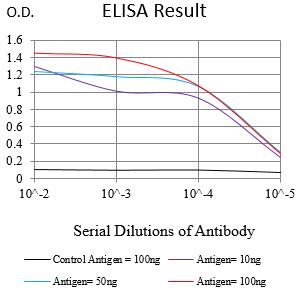
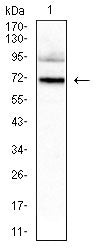
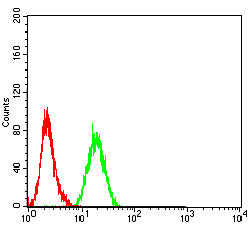
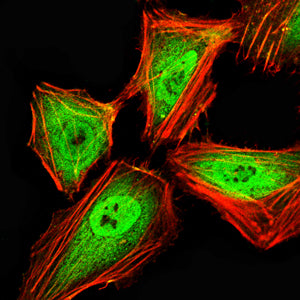
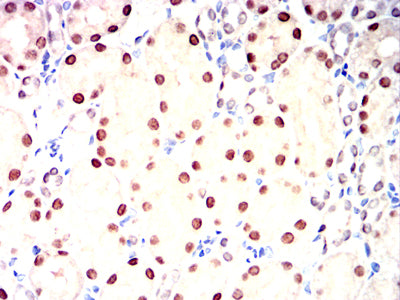
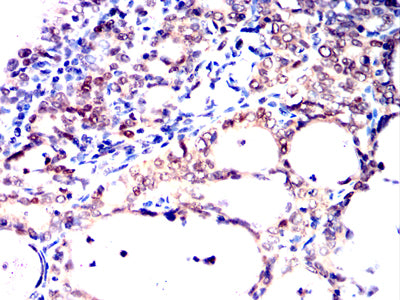
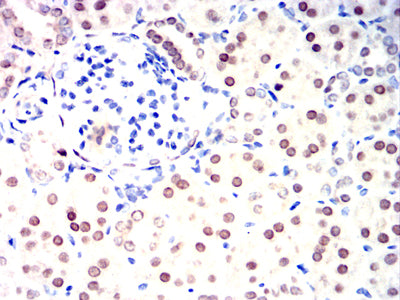
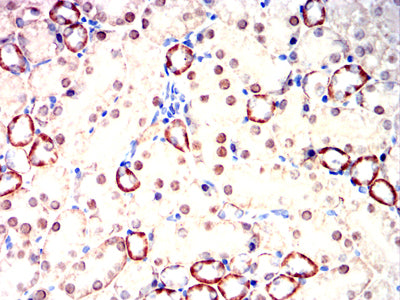
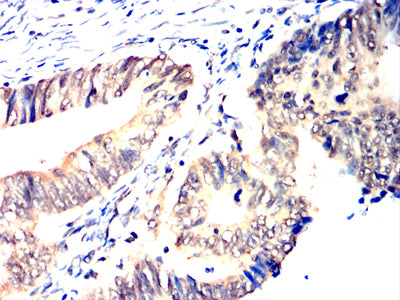
| WB | 1/500 - 1/2000 | Human,Mouse,Rat |
| IF | 咨询技术 | Human,Mouse,Rat |
| IHC | 1/200 - 1/1000 | Human,Mouse,Rat |
| ICC | 1/50 - 1/200 | Human,Mouse,Rat |
| FCM | 1/200 - 1/400 | Human,Mouse,Rat |
| Elisa | 1/10000 | Human,Mouse,Rat |
| Aliases | T2D; FJHN; HNF2; LFB3; RCAD; TCF2; HPC11; LF-B3; MODY5; TCF-2; VHNF1; ADTKD3; HNF-1B; HNF1beta; HNF-1-beta |
| Entrez GeneID | 6928 |
| clone | 4H5C7 |
| WB Predicted band size | 61.3kDa |
| Host/Isotype | Mouse IgG2a |
| Antibody Type | Primary antibody |
| Storage | Store at 4°C short term. Aliquot and store at -20°C long term. Avoid freeze/thaw cycles. |
| Species Reactivity | Human, Mouse, Rat |
| Immunogen | Purified recombinant fragment of human HNF1B (AA: 23-132) expressed in E. Coli. |
| Formulation | Purified antibody in PBS with 0.05% sodium azide |
+ +
以下是关于HNF1B抗体的3篇参考文献示例(注:部分信息为示例性概括,实际文献需根据具体数据库检索确认):
---
1. **文献名称**: *HNF1B Autoantibodies in Atypical Diabetes and Renal Dysfunction*
**作者**: Smith A, et al.
**摘要**: 探讨HNF1B自身抗体在非典型糖尿病(如MODY5)及伴随肾囊肿患者中的存在,提示其作为RCAD综合征的潜在血清标志物。
2. **文献名称**: *HNF1B Antibodies as a Marker for Congenital Kidney Anomalies*
**作者**: Johnson R, Brown K.
**摘要**: 研究HNF1B抗体在先天性肾脏发育异常(如肾单位减少症)患者中的表达,分析其与基因突变的相关性及临床诊断价值。
3. **文献名称**: *Immunohistochemical Detection of HNF1B in Pancreatic β-Cells*
**作者**: Lee S, et al.
**摘要**: 描述针对HNF1B蛋白的单克隆抗体制备及应用,用于胰岛β细胞功能研究,揭示HNF1B在胰岛素分泌调控中的作用。
---
**备注**:实际文献需通过PubMed、Google Scholar等平台以关键词“HNF1B antibody”、“MODY5”、“renal cysts and diabetes”等检索获取。部分研究可能侧重基因而非抗体,需注意筛选。
Hepatocyte nuclear factor 1-beta (HNF1B), also known as transcription factor 2 (TCF2), is a critical regulator of gene expression in embryonic development and tissue-specific functions. It belongs to the homeodomain-containing transcription factor family and plays essential roles in the formation and maintenance of organs, including the kidneys, liver, pancreas, and genitourinary tract. HNF1B mutations are linked to autosomal dominant disorders such as maturity-onset diabetes of the young type 5 (MODY5), renal cysts and diabetes (RCAD) syndrome, and congenital anomalies of the kidney and urinary tract (CAKUT).
HNF1B antibodies are immunological tools used to detect and study the expression, localization, and function of the HNF1B protein in research and diagnostic settings. These antibodies are pivotal in immunohistochemistry (IHC), Western blotting, and immunofluorescence to assess HNF1B levels in tissue samples, aiding in the identification of diseases associated with HNF1B dysfunction. In research, they help elucidate HNF1B’s role in transcriptional regulation, organogenesis, and metabolic pathways.
Clinically, HNF1B antibody-based assays assist in diagnosing genetic disorders and understanding tissue-specific pathology. Aberrant HNF1B expression has also been implicated in certain cancers, making these antibodies valuable in oncology studies. However, interpreting results requires caution due to potential cross-reactivity or variability in antibody specificity. Overall, HNF1B antibodies serve as vital reagents bridging molecular research and clinical diagnostics.
×